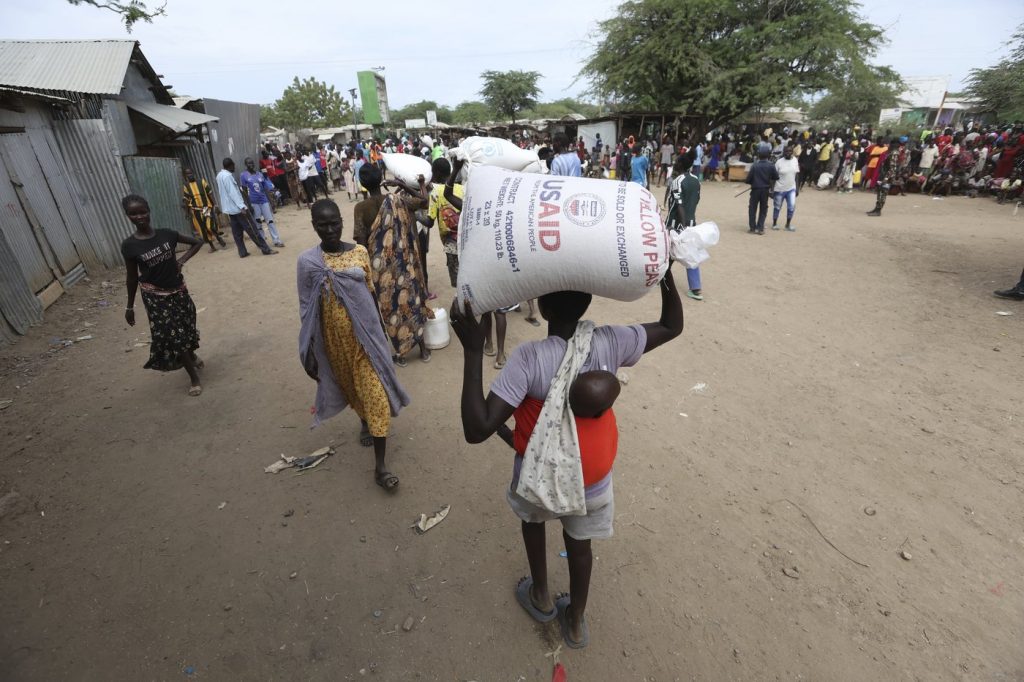KAKUMA, Kenya (AP) — In the remote Kakuma refugee camp, Martin Komol faces the harsh realities of life as a refugee. His mud-walled house, which is cracking and in danger of collapse, reflects the despair felt by him and the 300,000 other refugees living in the camp. Food rations, once a vital lifeline, have drastically decreased, leaving families like Komol's struggling to survive.
Funding cuts from the U.N. World Food Program (WFP) have ensued after the Trump administration paused support in March, symbolizing a larger decline in foreign aid from the U.S., previously a major donor. As a result, Komol, a widowed father of five originally from Uganda, has been forced to rely on neighbors for support after his food supply ran out two weeks ago. He has resorted to eating only one meal a day, or sometimes none for two days, leading to deteriorating health and chronic hunger.
Food rations have been halved, causing distress among refugees, evidenced by protests earlier in March. The monthly cash transfers that allowed refugees to buy additional protein and vegetables to supplement their meager rice, lentils, and cooking oil from WFP have ceased this month, further exacerbating the situation.
Currently, each refugee receives merely 3 kilograms (6 pounds) of rice each month—substantially less than the recommended 9 kilograms for adequate nutrition. The WFP anticipates receiving additional rice donations by August. However, without urgent funding, only the most vulnerable refugees may receive any assistance, as indicated by Colin Buleti, WFP's head in Kakuma. The organization is appealing to other donors for help.
As dust swirls around the makeshift homes in the camp, children play unaware of the grim circumstances their families are enduring. However, even the youngest cannot avoid hunger; Komol’s 10-year-old daughter, seeking solace in her schoolbooks during mealtime shortages, has learned to ask neighbors for food, often going to bed hungry. The family has taken to drinking water to stave off hunger whenever they can.
The drastic decline in food rations has led to worrying rates of malnutrition among children under five years and pregnant or breastfeeding women. At Kakuma's largest hospital, managed by the International Rescue Committee, malnourished children are given fortified formula milk, yet many arrive too late, with a significant number dying shortly after admission. The hospital has seen alarming spikes in malnutrition cases, with chronic shortages of nutrient-dense food affecting recovery efforts.
Nutrition officer Sammy Nyang'a raises concerns about the future, noting that with the end of cash transfers, more families will struggle to provide a balanced diet. The hospital had previously provided nourishing porridge for children and mothers, but supplies are now exhausted, leading to a potential humanitarian crisis if the situation does not improve.
In the hospital ward filled with wary children, caregivers like Susan Martine from South Sudan are witnessing the impact of malnutrition firsthand. Her 2-year-old daughter suffers from severe malnutrition that has left her with sores. Martine's other children continue to receive hot lunches through the WFP school feeding program—often their only meal of the day—but this program is also at risk due to funding cuts.
The funding reductions are reverberating beyond the refugee community. Local businessman Chol Jook has experienced substantial losses, seeing monthly sales drop dramatically as the WFP cash transfer program that once supported local commerce has been halted. Many affected families may resort to taking on debt as they struggle to purchase food on credit.











